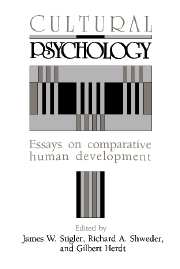Book contents
- Frontmatter
- Contents
- Preface
- Cultural psychology – what is it?
- Part I The keynote address
- Part II Cultural cognition
- 2 Some propositions about the relations between culture and human cognition
- 3 Culture and moral development
- 4 The laws of sympathetic magic
- 5 The development from child speaker to native speaker
- Part III Cultural learning
- Part IV Cultural selves
- Part V Cultural conceptions of psychoanalysis
- Part VI Cultural domination and dominions
- Part VII A skeptical reflection
- List of conference participants
- Name index
- Subject index
3 - Culture and moral development
Published online by Cambridge University Press: 05 June 2012
- Frontmatter
- Contents
- Preface
- Cultural psychology – what is it?
- Part I The keynote address
- Part II Cultural cognition
- 2 Some propositions about the relations between culture and human cognition
- 3 Culture and moral development
- 4 The laws of sympathetic magic
- 5 The development from child speaker to native speaker
- Part III Cultural learning
- Part IV Cultural selves
- Part V Cultural conceptions of psychoanalysis
- Part VI Cultural domination and dominions
- Part VII A skeptical reflection
- List of conference participants
- Name index
- Subject index
Summary
This essay reports the results of a cross-cultural development study of ideas about the moral (its form) and ideas about what is moral (its content). The informants for the study are children, five to thirteen years of age, and adults, male and female, from Brahman and “Untouchable” families in the orthodox Hindu temple town of Bhubaneswar, Orissa, India; and from Judeo-Christian families in the secular university neighborhood of Hyde Park in Chicago, Illinois.
One aim of the essay is to assess the strengths and limitations of two prominent and important theories about the origins and development of moral understandings: Kohlberg's “cognitive developmental” theory (Kohlberg 1969, 1981; Kohlberg, Levine, and Hewer 1983) and Turiel's “social interactional” theory (Turiel 1979, 1983; Nucci and Turiel 1978; Turiel and Smetana 1984). A second aim is to highlight the role of social communication processes in the ontogeny of moral understandings by outlining a “social communication” theory of moral development and using it to interpret the similarities and differences in the moral understandings of children and adults in the two cultures.
Three theories of moral development
The three theories to be discussed present different portraits and accounts of the ontogenetic origins of the idea of a moral obligation. Kohlberg's “cognitive developmental” theory hypothesizes that a genuine understanding of the idea of a moral obligation (stages five and six) has its origins in the idea of a conventional, or consensusbased, obligation (stages three and four).
- Type
- Chapter
- Information
- Cultural PsychologyEssays on Comparative Human Development, pp. 130 - 204Publisher: Cambridge University PressPrint publication year: 1990
- 78
- Cited by



